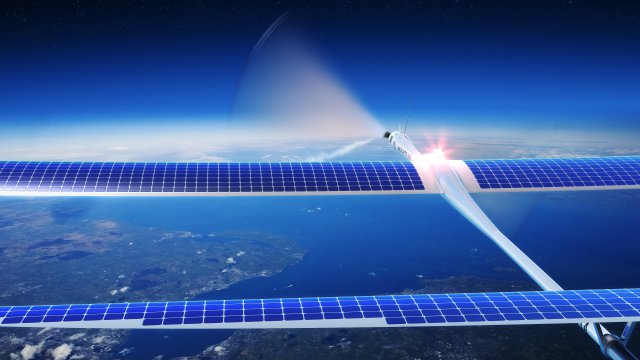 Facebook, one of the primary backers of the Internet.org initiative, which aims to bring affordable Internet access to the 5 billion people in the world who still lack connectivity, is in talks with a company that could help further that agenda. Facebook is buying Titan Aerospace, makers of near-orbital, solar-powered UAS which can fly for five years without needing to land. According to a source with access to information about the deal, the price for this acquisition is $60 million.
Facebook, one of the primary backers of the Internet.org initiative, which aims to bring affordable Internet access to the 5 billion people in the world who still lack connectivity, is in talks with a company that could help further that agenda. Facebook is buying Titan Aerospace, makers of near-orbital, solar-powered UAS which can fly for five years without needing to land. According to a source with access to information about the deal, the price for this acquisition is $60 million.
Facebook is interested in using these high-flying UAS to blanket parts of the world without Internet access, beginning with Africa. The company would start by building 11,000 of these unmanned aircraft systems (UAS), specifically the “Solara 60″ model.
Titan’s UAS are “atmospheric satellites” that can conduct most of the operations of an orbital satellite, but are cheaper and more versatile. They could potentially have many uses, including weather monitoring, disaster recovery, Earth imaging, or communications, the company has said, but clearly Facebook would be interested in that latter part.
The Solara 50 and 60 models can be launched at night using power from internal battery packs, then when the sun rises, they can store enough energy to ascend to 20KM above sea level where they can remain for five years without needing to land or refuel. Such capabilities make them ideal for regional Internet systems, like those that Internet.org would be focused on. (For those interested, Ars Technica took a more in-depth look at the technology and history behind Titan’s aircraft last August).
Titan Aerospace is a privately held venture with R&D facilities in New Mexico. The company has raised an undisclosed amount of funding through seed and Series A and A-1 rounds, and had announced in October 2013 it would open a B round soon.
Titan is currently led by CEO Vern Raburn, previously founder and CEO of Eclipse Aviation. The company was founded in 2012 by Max Yaney (CTO), in order to produce what it refers to as “atmosats,” new types of UAS that do the work of near-Earth satellites at a fraction of the cost.
The designation of “satellites” is important here, as the idea has been to position these aircraft above the airspace that the FAA regulates in the U.S. Class A airspace ends at 60,000 feet stateside, and above that the U.S. doesn’t regulate, Fortune had pointed out last summer. That means the only issue in launching these in the U.S. would be the initial climb. In other parts of the world, the laws will, of course, vary. But in the developing markets Internet.org is focused on, it’s likely they’re not as far along in regulating such new technology.
Following the acquisition, all of Titan Aerospace’s production would be for the Internet.org project only, according to a source familiar with the matter.
Photo: Solara S 50 – Titan
